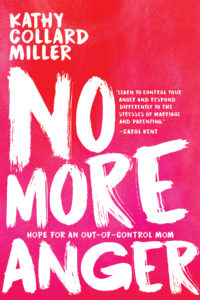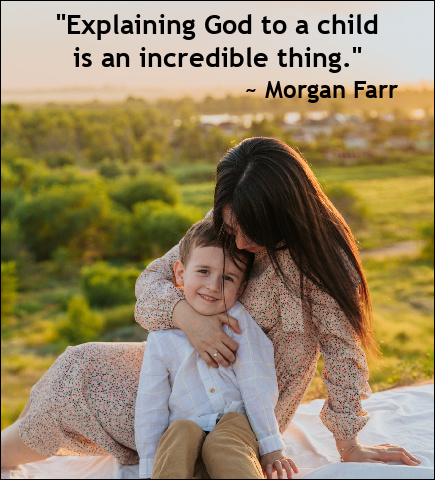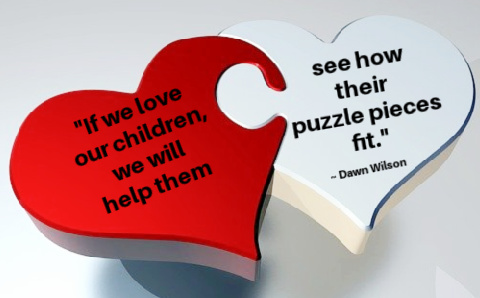Open Your Child's Eyes to the World
Sally Ferguson's worldview informs everything she does, including how she parents. In this Parenting UPGRADE, she notes the pull of the world and suggests some ways we might open our children's eyes to the world in a godly way.
“Our children are exposed to the world’s view of life through television and the internet," Sally says. "I wanted to find a way to help them see God’s view of the world."
I (Dawn) love this approach to parenting. The world wants to open our children's eyes, but not always in the way we appreciate! How much better that parents think proactively and give their children a view of the world from heaven's perspective, especially a view of missions.
Sally continues . . .
Every time I travel to Uganda, I marvel at the joy I see in believers. Our view of trials is vastly different and worthy of note.
We have a lot to learn from our brothers and sisters around the world—their view of possessions does not dominate their view of their wealth.
How can a mom translate that to her children and cultivate a Christian worldview?
Open Your Child's Eyes to the World
1. Explore, Don't Shelter.
My peacekeeper personality has always wanted to shelter my children from the dangers and drama of this world. Instead, the news infiltrates all of society.
If we let it, this becomes an opportunity to discuss a Christ-like response to the events of our day.
Explore ideas. What are some ways you can talk about school shootings and political character assassinations? How can a Christian respond with faith rather than fear?
- Research topics together with reputable organizations like Answers in Genesis and Focus on the Family. (1)
- Take a road trip and visit The Museum of the Bible for perspective. (2)
2. Grab Their Passion.
Missionaries on furlough travel to share their experiences. Contact them ahead of time to fit into their schedule. You have an opportunity to hear their stories over a meal or an outing. You’ll find contagious enthusiasm about the world from their vantage point. (3)
When our missionaries and their four children came to our home for a visit, my kids had a grand time playing and hearing about life in Africa.
We took them to a state park where they enjoyed the lush scenery and hiking paths. It was a win for all.
3. Encourage Their Questions.
Spark your child's curiosity by looking up the location of missionaries on the globe. (4)
- Talk about the details of traveling there, living there, and interacting with the culture.
- What do they eat?
- What language do they speak?
- How do they get to school?
My friend Dani hosts dinners for her children. They:
- research a country,
- wear costumes to imitate the local style,
- eat native foods,
- and practice some words in the language of that country.
Her children are learning to embrace other cultures.
4. Stamp your Passport.
The family that travels together celebrates life!
We are a part of an intricate human race. Open up a world of possibilities to your children by taking them on missions trips. Not only does a team invest in the culture, but it also invests in each other as a support system while together.
Your child will connect with adults who have a mindset to serve and learn.
When you immerse yourself in another culture, you experience it with all five senses on high alert.
People become more than names—they take on the warm flesh of humanity.
One of our church trips to Africa included three family units. They created a lifetime of memories in their travels and made room in their hearts for others. Thirteen years later, those families still talk about the adventure they had together.
5. Lead by Example.
Children imitate what they see us do.
Our involvement with global issues informs their willingness to get involved. Inspire them to think outside the box.
- Could they set up a lemonade stand or mow lawns to raise money for child sponsorship?
- Could they draw pictures or write to encourage a child across the globe?
My friend Debbie includes her granddaughters in visits to shut-ins. They make someone else’s day with their artwork while learning to serve.
As a country, America has been blessed with abundance. In Romans 15:27, Paul says it is right for us to share our material blessings with those who bless us spiritually.
I have seen a wealth of joy come from the most humble of circumstances and realized I am the impoverished one. We could never outgive that gift of joy.
Let your children experience the world with you—in tow.
Let faith inform your conversations and provide a solid foundation as they move toward adulthood.
Instead of raising worldly children, let’s raise world-class Christians.
How will you show your child the world?
Sally Ferguson is a teacher of God’s Word and a student of people. Whether leading retreats or small groups, she loves to see the light shine when hope abounds. Sally lives in western New York with her husband and her dad. Her current project is a Bible study for caregivers. Catch up with her at sallyferguson.net.
Graphic adapted, courtesy of Alexa's Fotos at Pixabay.
References in the article:
(1) https://answersingenesis.org/, https://www.focusonthefamily.com/culture/
(2) https://www.museumofthebible.org/k-12-programs
(3) http://upgradewithdawn.com/blog/2022/4/12/how-to-champion-your-missionaries.html
(4) http://upgradewithdawn.com/blog/2021/9/10/helping-your-children-dream.html
 Post a Comment → Posted on
Post a Comment → Posted on  Tuesday, June 13, 2023 at 11:00AM
Tuesday, June 13, 2023 at 11:00AM 













